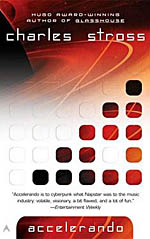
![]() Triseult
Triseult
3/24/2012
![]()
The heart of Stross' Acceledando deals with a concept that is dear to present-day SF authors and futurists: that of the Vingean singularity, a theoretical point in our near-future where technological progress will move so quickly that all futurist prediction models are useless. Disregarding the fact that futurism has yet to come up with a single prediction model that works besides Moore's Law, the concept of a point in history where technology accelerates towards infinity is definitely worthy of a little SF exploration.
Although the Vingean singularity has been discussed in previous SF works (none the least by Vernor Vinge, after which the concept is named), Charles Stross proposes to actually walk the reader through the times leading up to it, then through it and its aftermath. This clearly places the novel in the realm of Big Ideas, and on that promise, it deliver. In spades.
Quite frankly, Accelerando dwarfs even Stephen Baxter's best works (such as Manifold: Time) in terms of mind-boggling concepts per square inch. Stross, with the carelessness of the truly gifted, tosses about big ideas faster than the reader can juggle them. This is a book for nerds, written by a proud one: it talks about galactic routers, AI taking over Humanity, sentient economics, and Matrioshka brains, all within the span of a single, coherent story.
It's a good thing these concepts are so strong and resounding, because plot-wise, Accelerando is a little thin. The main character, Manfred Macx, is some sort of copyright anarchist that's just too cool for the world he lives in, and frankly, there's not much to love about him. Things get a bit better with his daughter Amber, but not by much. The main problem is that Stross chose extraordinary individuals to present extraordinary times, thus missing an opportunity to make the strangeness of emerging posthumanism resound on a more intimate level with the reader.
In conjunction with this, there is the fact that not much happens in the personal lives of the protagonists. Events on a galactic scale unfold around them and, yes, change their lives, but the protagonists do little more than witness them, ponder them a little, and move on. This might be made worse by the fact that the novel is actually a collection of 9 short stories, published by Stross over a period of time; but there is little sense of progression and action, and a lot of contemplation. Luckily, it's not so bad considering how cool the changes happening around turn out to be, but it's frustrating to see uninteresting characters worry about their personal relationships while god-like AI are busy dismantling the solar system to build a super-computer.
Another annoyance I have with Accelerando is that, despite the alien world it tries to depict as the novel advances, the author's metaphors and points of reference remain deeply rooted in the present. It's especially annoying at the start of the novel, meant to take place 20 years from now, where multiple references are made to current-day netspeak, such as 'Slashdot effect' and 'blogging'. This plants the first chapters of the novel firmly in wha I call 'nerd porn' territory, a SF style that cares more about pandering to modern-day technophiles than establishing believeability. To think the term 'blog' will be cool in 2025 is as silly as those old 50's SF novels that used 'atomic' and 'laser' every 2 sentences. I already spoke about this problem with Stross' style in my review of Singularity Sky, and thankfully it's not as bad this time around.
Fortunately, the 'nerd porn' effect dissipates after the first 3 chapters (although a particular reference to 9/11 in the final chapter of the novel was especially cringe-worthy), and Stross picks weirder and weirder concepts to throw at the reader. Ultimately, the novel is a satisfying joyride for the brain, and well worth a look by any SF afficiando.